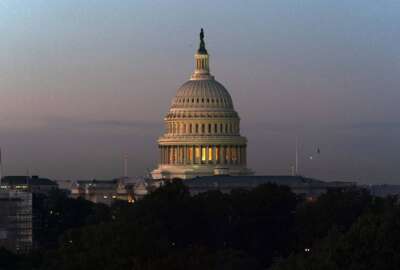
Whistleblower awards are falling faster than Facebook stock
Last year the government agencies paid whistleblowers $237 million for exposing waste and fraud. It was the lowest yearly total since 2008.
Best listening experience is on Chrome, Firefox or Safari. Subscribe to Federal Drive’s daily audio interviews on Apple Podcasts or PodcastOne.
Last year the government agencies paid whistleblowers $237 million for exposing waste and fraud. It was the lowest yearly total since 2008. By comparison, the total reached $715 million in 2014. For what’s going on, long time whistleblower attorney Stephen Kohn joined the Federal Drive with Tom Temin.
Interview transcript:
Tom Temin: Steve, good to have you back.
Stephen Kohn: Thank you so much for having me here.
Tom Temin: So is the government becoming so honest and so squeaky clean that there’s very little waste, fraud and abuse to expose, and whistleblowers are out of luck?
Stephen Kohn: That’s exactly it. The more money they spend, the less fraud there is. Obviously, there’s no fraud and COVID spending. Yeah, it’s the Department of Justice priorities, and really the Department of Justice falling way behind. They’re going into court, instead of backing up the whistleblower. Often they go into court to have a whistleblowers case dismissed. Now, what’s remarkable about that is that the company — the fraudster —could file to have the case dismissed if it had no merit. Why is the government spending taxpayer dollars to throw out whistleblower cases?
Tom Temin: Do we have any numbers on cases filed and any trends on cases that the Justice Department has sought to dismiss?
Stephen Kohn: Well, we really don’t. But what we do have, and this is really interesting, is that the government is ignoring a lot of very valid whistleblower cases. Now, there’s no statistic on this. But I can tell you as someone who represents a lot of whistleblowers, and who does a lot of these cases, we’ve had a number of major cases where the line attorney has said, we’re recommending to intervene, we’re recommending to get behind this case, and they never do. And then what we see is this shift from the government supporting the whistleblower cases to the government trying to gin up their own cases without whistleblowers. So in the last two years, they have filed more cases on their own, without whistleblowers, than any time ever since about 1985 or something like that, like in the last 20 years. And those cases aren’t as good, because everybody knows on corporate fraud, you need an insider. The beauty of the False Claims Act is it incentivizes people on the inside to come forward. And it’s worked remarkably well. Before this year, it was viewed as the single most effective anti-fraud law in the United States.
Tom Temin: So as a result of these trends are fewer whistleblowers simply filing cases, if they believe that they won’t get hurt, or they’ll be dismissed, or worse, they’ll get retaliated against, which is also illegal. But that’s not to say it never happens.
Stephen Kohn: In fact, it’s the opposite. So the Justice Department that has jurisdiction over all the government fraud cases clearly is backing away from the whistleblowers in a number of major ways. But now let’s look at the U.S. Securities and Exchange Commission, which also has a whistleblower program. Well, in the same fiscal year, they gave out twice the amount of awards in a far smaller program. The Department of Justice program is not just the frauds division in Washington — all of the U.S. attorneys throughout the United States have jurisdiction and do file these cases. Whereas SEC, it’s the enforcement division within Washington. And guess what, twice as much in awards and 60,000 whistleblowers have entered that program in the last 10 years. Whereas with the Department of Justice, to give you a number in 2021, it was 598. And the year before, 675. And one of the reasons for this is the SEC has made their program user-friendly, a great webpage. The Department of Justice doesn’t really have a webpage for how to file and what to do with false claims, how to report government fraud. A lot of the webpages bring you to an inspector general, and they don’t even mention the whistleblower law. The SEC has a great webpage, they have great provisions for confidentiality and anonymity, whereas the Justice Department often opposes confidentiality for the whistleblower claiming. ‘Oh, everyone has a right to know who this whistleblower is’ — be for real! If a whistleblower can’t be confidential, they’re going to be a lot more afraid to step forward. So now we have these two programs. And the SEC programs modeled on the False Claims Act. But the DoJ, in my view, is stuck where they were 20 years ago. And the SEC has really learned lessons.
Tom Temin: We’re speaking with Stephen Kohn. He’s a partner at the law firm Kohn, Kohn & Colapinto. And given the fact that there’s this two-year trend, you can’t really say, well, it was the Trump administration or the Biden administration, because we’re now, you know, some 13 or 14 months into the Biden team. So is there something else at work here other than politics, because there are administration’s more and less favorable to whistleblowers?
Stephen Kohn: Well, whistleblowing has tended to be bipartisan, and the Justice Department has tended to be pretty good in all the administrations, it’s done at a career level. It’s more the internal operating policies. It’s like, why do you have a policy that spends federal taxpayer dollars attacking whistleblowers, getting their cases thrown out of court, when the government contractor could do that on their own? Why do you have a policy not really sympathetic to confidentiality? They also have a policy, and I know this from talking to lawyers doing cases, about bringing down the amount of an award. Now in the SEC and other programs, people have learned large awards incentivize the most well-placed whistleblowers. If you give a whistleblower like a $100 million, the government gets back billions, because it incentivizes so many people to come forward and you get the really big executives. DOJ has an opposite policy: the larger the potential award, the more they try to drive it down. So catch this, in the 35 years of the False Claims Act, they have never given an individual whistleblower a $100 million award. Granted, it’s rare, they’ve never done it. The SEC has done it twice in 10 years. The Commodity Futures Trading Commission, which is a tiny organization, has done it once. And the IRS has done it at least twice. These are exceptionally rare awards, but they have massive impact in making everyone aware of the program. And most important, stimulating the highest level executives at the highest pay scales to come forward. Yet the DOJ has never done it with a massively larger program.
Tom Temin: Well, could it be simply that the SEC, when you’re getting into securities fraud, you’re getting into big time financial crime, whereas in federal contracting, often the stakes are not simply that big that there’s not even $100 million at stake in the whole case?
Stephen Kohn: Well, no. As you see, many of the largest cases have been against very large companies, very large contracts, and against pharmaceutical companies. There have been multiple billion dollar judgments in the False Claims Act, because they can go after pharmaceutical companies for essentially for false advertising for false marketing, and you’re talking about all Medicare/Medicaid fraud, getting to major hospitals, conglomerates, and the largest defense contractors out there that have billion dollar contracts. What we have seen is that the federal government in the False Claims Act negotiates down and threatens. So in other words, they’ll say you take 15% instead of 25% and we won’t challenge you. We’ll cut the deal with you. And I’ve actually said this to U.S. attorneys, and I’ve said, this is crazy. The more you give my whistleblower, the better sources, you have, the bigger deterrent effect. But they’re no no, my job is to save the government money. Well, why don’t you save the government money by incentivizing people to expose the fraudsters?
Tom Temin: In other words, they’re almost plea bargaining, in a sense.
Stephen Kohn: They’re used to that, instead of looking at the law, looking at the statute, and just simply applying it. SEC has been doing that and so has other agencies, where they look at the criteria, and they don’t look at the amount. Now here’s something fascinating: The SEC under Trump instituted a rule-making proceeding to lower the amount of awards in large cases. So they looked at it and said, no one needs this much money. And they voted out the proposal three to two — the three Republicans supporting it, the two Democrats opposing it — and then there was a big rule-making. And we participated, we met with the commissioners, we fought a lot of letters, we demonstrated the numbers on the deterrent effect of a large award on the incentivization effect. They voted in September 2020 unanimously, led by the Trump appointed chairman, to reject lowering awards. They realized it was their best sales to fish.
Tom Temin: Well, one other question, then. Given the fact that if ships come in and attract seagulls, so the more ships that are coming in, the more seagulls you get. In 2020, 2021, and if they can get away with it this year, the Congress will spend trillions on this program, that program, you name it, whatever the injustice or cause or painful condition the country is in. That would seem like there’s ripe territory for all of that spending. Look at the payroll protection plan, yet very little has come forward in this, even in the oversight bodies.
Stephen Kohn: Exactly. And the reason is simple. The only way — the best way — to detect white collar crime and corporate fraud, which is always well hidden and disguised, is through an insider. That’s it. Every statistic shows it, every study shows it. So the more the Justice Department doesn’t use the tools it has to incentivize whistleblowers, the more that taxpayers are being badly ripped off.
Tom Temin: Alright, is there any legislative fix for this because, you know, Congress tinkers with whistleblower laws from time to time?
Stephen Kohn: Yes. So Senator Grassley, in a bipartisan bill — and he’s been the largest champion of whistleblowers, he’s done an absolutely incredible job — has a bill to amend the False Claims Act. And he’s looking at two specific provisions. The first is to put limits on the Department of Justice’s ability to throw out lawsuits. He wants to have higher standards, so they just can’t walk in and have a case tossed at will, which is what most courts, they just bend over backwards. Justice wants it thrown out, it’s thrown out. So he wants to put some limits on that. It’ll save the taxpayers money, force the contractors to do their own bidding. He also wants to tighten up some of the definitions and make the law better. Can more be done? Absolutely, yes. The other gigantic issue there is confidentiality for whistleblowers. But Justice can do that on its own without a legislative fix, by changing their internal policies.
Tom Temin: Alright, so memo to meritus.
Stephen Kohn: Yeah. when he was in the D.C. Circuit, he wrote some great opinions on the False Claims Act. In fact, he was on a DOJ team before the law was amended in 1986. And in 1979, he was part of a DOJ team looking into improving the False Claims Act. He should know there needs to be leadership, there needs to be priority, because this is how you keep the trillions of dollars being used safely.
Tom Temin: Stephen Kohn is a partner at the law firm Kohn, Kohn & Colapinto. Thanks so much for joining me.
Stephen Kohn: Well, thank you so much.
Copyright © 2024 Federal News Network. All rights reserved. This website is not intended for users located within the European Economic Area.
Tom Temin is host of the Federal Drive and has been providing insight on federal technology and management issues for more than 30 years.
Follow @tteminWFED
Related Stories





